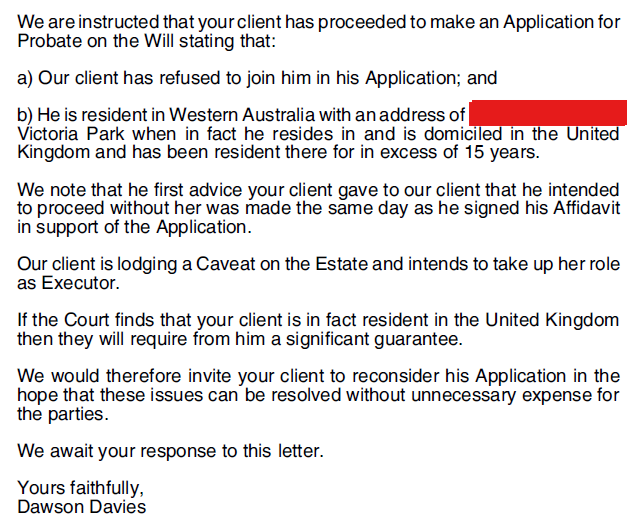Requirements for sureties and guarantees
Sureties and guarantees may be required if an applicant for administration is resident outside of Western Australia.

Administration Act 1903, Section 26:
Power to Require Administrator to Produce Sureties
The provisions in question establish a framework within which a court may require guarantees from administrators of estates to safeguard the interests of persons concerned with the administration. Here's a breakdown and interpretation of the key elements from the relevant sections of the Administration Act 1903 and the Non-Contentious Probate Rules 1967:
Subsection (1) introduces the court's authority to demand sureties as a condition for granting administration. This requirement aims to protect interested parties against losses due to the administrator's failure to fulfil their duties. The court may specify a limit on the total liability of the surety(ies).
Subsection (2) outlines the court's ability to request further guarantees or adjust a surety's liability, which ensures flexibility in protecting the estate and interested parties based on evolving circumstances.
Subsection (3) clarifies that any additional guarantee is considered as if it were an original guarantee required under subsection (1).
Subsection (4) details that guarantees benefit all interested parties and treats multiple sureties as having joint and several liabilities, enhancing the security provided to the estate.
Subsection (5) restricts actions on the guarantee to those with court or Principal Registrar approval, establishing oversight on legal actions related to the guarantee.
Subsection (6) allows a surety to seek relief from the court if the estate is at risk, they are prejudiced by the administrator's actions, or they wish to be discharged from further liability, providing a mechanism for sureties to address concerns.
Subsection (7) affirms the section's application to all cases of granted administration under this Act, ensuring broad applicability.
Subsection (8) exempts certain administrations, such as those by the Public Trustee or as prescribed by rules, from these requirements, recognising situations where such guarantees may not be necessary.

Non-contentious Probate Rules 1963, Rule 27: Guarantee Where Administration Applied For
(a) for the use and benefit of another person or where the grant is otherwise limited;
(b) to an applicant who appears to the Registrar to be resident elsewhere than in Western Australia;
(c) where a beneficiary is not of full age or capacity; or
(d) where a beneficiary is not resident in Western Australia and has no agent or attorney there;
or except where the Registrar considers that there are special circumstances making it desirable to require a guarantee.
Subrule (1) specifies conditions under which a registrar is to require a guarantee pursuant to Section 26 of the Administration Act, focusing on cases where there's perceived increased risk due to factors like non-residence or limited grants.
Subrule (2) exempts certain applicants from the guarantee requirement unless special circumstances exist, acknowledging the lower risk or greater reliability associated with corporations authorised in Western Australia or legal practitioners.
(a) a corporation authorised by the law of Western Australia to obtain a grant; or
(b) a person holding a current practice certificate under the Legal Practitioners Act 1893.
These sections collectively ensure that the administration of estates is conducted with a degree of financial security for the benefit of interested parties. The court's discretion in requiring sureties, adjusting their liabilities, and considering exemptions balances the need for protection with the practicalities of administering estates.
Under which circumstances will the court require sureties?
The explicit circumstances under which a court requires sureties, as outlined in the Administration Act 1903 and further specified in the Non-contentious Probate Rules 1963, include situations where:
Administration is granted for the use and benefit of another person or where the grant is otherwise limited. This typically occurs when the administrator is acting in a fiduciary capacity for beneficiaries who may not directly manage the estate, necessitating additional security to ensure proper administration.
The applicant for administration is resident outside of Western Australia. This requirement reflects the potential complications and increased risk of managing an estate from afar, including challenges in enforcing legal responsibilities and obligations.
A beneficiary is not of full age or lacks capacity. Minors or individuals unable to manage their affairs require special protection to ensure their interests are safeguarded throughout the administration process.
A beneficiary is not resident in Western Australia and does not have an agent or attorney in the state. Similar to non-resident administrators, non-resident beneficiaries present a risk that the court aims to mitigate through the requirement of sureties.
Special circumstances exist that, in the Registrar's judgment, make it desirable to require a guarantee. This provision allows for flexibility, enabling the court or registrar to demand sureties in situations that may not fit the other specified categories but where the risk to the estate or beneficiaries is perceived to be higher.
These conditions aim to protect the interests of the estate and its beneficiaries, especially in situations that pose a higher risk of mismanagement or loss. By requiring sureties, the court ensures that there is a financial guarantee in place to cover any losses that might occur due to the administrator's failure to fulfil their duties properly.
And what the explicit exclusions?
The explicit circumstances under which sureties are not required, as detailed in the Non-contentious Probate Rules 1963, are as follows:
When the applicant or one of the applicants is a corporation authorized by the law of Western Australia to obtain a grant. Corporations with legal authorization to administer estates in Western Australia are presumed to have the requisite professionalism and systems in place to manage estates properly, reducing the perceived risk to beneficiaries and the estate.
When the applicant holds a current practice certificate under the Legal Practitioners Act 1893. Legal practitioners with valid practice certificates are considered to have the knowledge, ethical obligations, and professional standards necessary to administer estates without the added security of sureties, barring special circumstances.
These exemptions are based on the assumption that certain entities and individuals possess inherent qualities or safeguards that minimize the risks associated with estate administration. However, it is important to note that even in these cases, the Registrar retains discretion to require a guarantee if there are "special circumstances" that make such a requirement desirable. This provision ensures flexibility and allows for protective measures to be applied based on the specific risks and nuances of each case.



